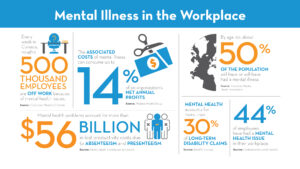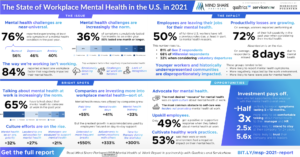According to recent studies, managers have an equal impact on their employees’ mental health as spouses and partners do.

According to a study published by the Workforce Institute at UKG, a top provider of HR, payroll, workforce management and research and education on workplace challenges, the calibre of leadership does, in fact, have an effect on people’s mental health. The same number of employees (69%) claimed that their management and spouse/partner both had an impact on their mental health. That was a higher percentage than those who stated their mental health was impacted by doctors (51%) and therapists (41%) combined.
2,200 workers from ten different nations were interviewed by the researchers, in addition to 600 C-suite executives and 600 HR executives in the United States. “We often discuss mental health in terms of burnout or medical diagnosis. While these are important challenges,” Pat Wadors, Chief People Officer at UKG, suggested that leaders need to discuss more the daily stressors employees experience.
Having open discussions about mental health can contribute to the development of a more welcoming and encouraging workplace when managers are more forthcoming about their own journeys with mental health. Wadors continued, “Life isn’t all honey and milk, and when leaders open up about their own problems, they understand they are not alone and that it’s OK not to be OK. The secret to fostering a sense of belonging at work and, in turn, the secret to resolving the workplace mental health problem is authentic, sensitive leadership.”
Workers reported that they are “often” or “often” weary at the end of the day, and 78% claimed that stress has a negative impact on how well they perform at work. Work has a negative impact on employees’ relationships (62%), well-being (64%), and home life (71%). One-fourth of those who report “bad” or “very poor” mental health, as opposed to 4% of those who report “good” or “excellent” mental health, claim to not have a good work-life balance.
While 40% of workers reported feeling stressed out about their jobs “often” or “often,” 42% of managers and 35% of senior leaders report feeling the same way. Furthermore, the Workplace Intelligence report found that 33% of C-level executives agreed with the statement, and the younger the executive, the more likely they were to do so. In fact, 40% of C-suite employees claimed they were likely to leave their jobs in the upcoming year owing to stress at work.
In collaboration with Qualtrics and ServiceNow, Mind Share Partners’ 2021 Mental Health at Work Reportprovides a unique assessment of the condition of mental health, stigma, and workplace culture in American workplaces before and after the pandemic. This follow-up study to the 2019 Mental Health at Work Reportemploys the same metrics and expands on the less thorough survey from April 2020 by adding new questions and segmentations on the pandemic’s effects, racial trauma, and the return to office. With statistically substantial representation across racial and ethnic backgrounds, gender identities, membership in the LGBTQ+ community, generational gaps, primary carer statuses, levels of seniority, and other characteristics, responses were gathered from 1,500 U.S. individuals working full-time.

A higher attrition rate
An increasing number of workers are quitting their employment due to mental health issues, particularly those brought on by workplace issues like excessive and unsustainable work. Although the attrition rates in 2019 were already fairly high, they have already increased even further. Compared to 50% of respondents overall (34% in 2019), 68% of Millennials (compared to 50% in 2019) and 81% of Gen Zers (compared to 75% in 2019) had left positions for mental health-related reasons. Ninety-one percent of respondents, up from 86% in 2019, thought that a company’s culture should support mental wellness.
High frequency
Employees at all organizational levels today commonly experience mental health difficulties. Seventy-six percent of participants—an increase from 59% in 2019—reported having had at least one symptom of a mental health disorder in the previous year. Given the numerous workplace and home stresses, that is not surprising, but it does provide evidence that almost everyone experiences mental health issues on a daily basis.
The 2019 study dispelled the assumption that successful leaders are immune by demonstrating the similar prevalence of mental health issues across all levels of seniority. The 2021 survey revealed that C-level and executive respondents were now actually more likely than other respondents to experience at least one mental health symptom, maybe as a result of having to lead during this unprecedented era.
The tremendous socioeconomic changes currently taking place have altered workplace cultures and employees’ perspectives on mental health. Employers have begun to invest more, but employees have legitimately raised the bar on what they expect from them. In order to improve workplace mental health, culture must alter to include more openness, compassion, and long-term approaches to problem-solving and collaboration.

